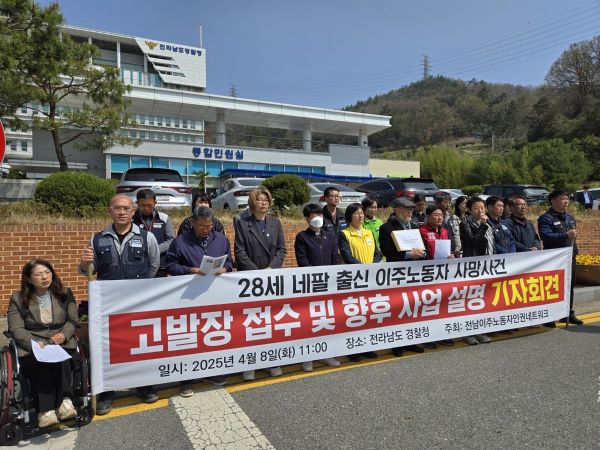News
"Discrimination was a structure, not an emotion" — The human rights situation of migrant workers revealed by the 2024 Gwangsan District investigation
- admin 7 days ago 2025.06.26 15:27
-
16
0
[Provided by Jeonnam Migrant Worker Human Rights Network. Reproduction and database prohibited]
The survey on the human rights situation of foreign residents conducted in Gwangsan-gu, Gwangju Metropolitan City in 2024 clearly showed how exposed the lives of migrant workers we encounter every day are to violence, disregard, and threats. According to the survey, 72.5% of respondents reported experiencing disregard from Koreans, 37.6% reported experiencing threats, and 35% reported experiencing verbal or physical abuse. This goes beyond mere unpleasant treatment, indicating that structural discrimination and human rights violations are being repeated as a daily occurrence.
"I couldn't lift my head" — Migrant workers whose daily lives are filled with enduring discrimination
This survey, conducted by Gwangsan-gu on over 500 migrants from six countries, revealed the vivid experiences of foreign residents. Some respondents stated, "I can't speak Korean well, and when I'm threatened, I can't even speak up," and "They threatened to report me if I did anything wrong, so I just lowered my head." This is not just an individual's misfortune, but proof that the structural environment they are in renders them powerless.
These results are likely not an isolated phenomenon in one region but a problem recurring across the country. In particular, the label of 'illegal immigrant' serves as a tool of intimidation for migrant workers, becoming a social shield that tolerates verbal abuse and exploitation.
Why were human rights protections omitted from the structure?
The Korea Local Administration Research Institute, which conducted the survey, diagnosed the core of this problem as "vulnerability in status of stay, language barriers, and workplace power structures." In reality, many migrant workers cannot protest even when subjected to verbal abuse or unfair treatment by supervisors at their workplaces. This is because, in addition to language barriers, the instability of their residency status can lead to the risk of deportation simply by raising an issue.
Furthermore, a significant portion of human rights violations occur at the workplace, with many employers failing to fulfill or even recognize their responsibility to protect human rights. As a result, the "right not to be discriminated against" becomes powerless in the field, and victims remain silent before receiving legal protection.
The following are institutional improvement measures pointed out by experts:
First, it is urgent to expand language support systems such as interpretation and translation. An environment must be created where migrant workers can immediately raise issues when they experience violence.
Second, it is necessary to mandate human rights education for employers and managers and strengthen on-site human rights monitoring. This is a minimum safeguard to prevent violence that occurs within power imbalances.
Third, education and counseling support on residency laws and regulations are needed. Beyond punitive policies focused solely on 'legal residency status,' the perception that they are within the scope of basic rights and protections must be expanded.
Fourth, anonymous reporting and victim protection systems must be strengthened. Shelters, psychological counseling, and legal support should be systematically operated, and above all, the 'safe recovery' of victims must be institutionally guaranteed.
"They were not just workers, they were neighbors"
The Gwangsan-gu survey did not just present numbers. It brought to the surface the 'hidden daily lives' that our society has long ignored. Verbal abuse, threats, and disregard are not just bad words or deviations but are structural consequences born from the blind spots of the system and societal silence.
Now, we cannot help but ask: "Why were they not called human beings?" Unless we answer this question, we will continue to make someone bow their head.
- Previous Post"Korean is difficult, and private education is a dream"... Multicultural youth face academic dropout crisis amid neglect2025.06.26
- Next Post“Blood flowed copiously”…Bloody brawl in the city center, citizen anxiety spreads due to foreign violence2025.06.25
Comment List
No comments available.
